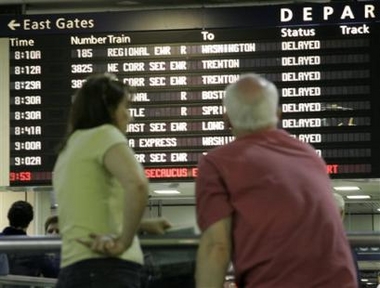Amtrak
 People look at an Amtrak schedule showing departure delays at Pennsylvania Station in New York on Thursday, May 25, 2006. A major power outage stranded thousands of rush-hour travellers between New York and Washington, stopping five trains inside tunnels and forcing many passengers to get out and walk to the nearest station. (AP Photo/Peter Morgan).
People look at an Amtrak schedule showing departure delays at Pennsylvania Station in New York on Thursday, May 25, 2006. A major power outage stranded thousands of rush-hour travellers between New York and Washington, stopping five trains inside tunnels and forcing many passengers to get out and walk to the nearest station. (AP Photo/Peter Morgan).The other day, Amtrak had a power outage, which inconvenienced many, including people on the commuter railroads that run on the Northeast Corridor. I learned about it from the FOE transportation blog, Getting There.
The Baltimore Sun has a nice editorial today, "Working on the railroad," about the issue this raises: to wit, the nation's underfunding of railroad transportation. It's somewhat related to the federal government's distinterest in the issues of cities (center cities/urban areas)--my joke that President Bush would be fine with it if the White House was in Springfield Virginia, ... (this came up in an interview yesterday with someone from Canada, and I contrasted how federal governments treat their capital cities in countries like Canada, the UK, and France, compared to how the U.S. government is somehwat indifferent when it comes to cities generally, and DC in particular (except for the fact that the federal government is based here).
From the editorial:
Between the delays, the fare increases, the shortage of parking at some stops, the crowded bus-like conditions of some of the more outdated cars, and the often surly attendants, you might assume that rail ridership was in a period of decline. And you'd be exactly wrong. Amtrak ridership is up, and so is MARC's. Commuters may have plenty of reasons to complain, but they must also have a strong motivation to take the train: MARC ridership has hit a historic high after nine straight years of growth.
That's why it's so frustrating that Amtrak is treated so shabbily by the White House. Over the years, the system may have been mismanaged at times, but it's also been half-starved. Amtrak badly needs to update its rail lines and other infrastructure. MARC needs an infusion of capital, too, but its situation has an added dimension. Any MARC expansion must pass muster with Amtrak and CSX, owners of MARC's Brunswick and Camden lines.
Passenger rail has untapped potential, and rising fuel costs only underscore the ridiculousness of the nation's failure to pursue it. Plenty of members of Congress understand this - so why can't President Bush? In a country addicted to oil, kicking the habit requires a serviceable fuel-efficient alternative to driving a car.
Interestingly enough, the federal government is still on their privatization kick for passenger railroad services. Access, the journal of the University of California Institute of Transportation, has an article on the negative impact of privatization of the railroad system in the United Kingdom. Unfortunately, this issue isn't yet online, but check back for the article.
Last week, the Richmond Times-Dispatch reported, in "Former Amtrak chief: transportation needs help: He says country lacks planning for ways to ease congestion on roads," about a conference sponsored by Virginians for High Speed Rail, where David Gunn, the recently fired president of Amtrak, was the keynote speaker. He said that:
The national transportation system is on a collision course with gridlock, the former head of Amtrak told a state rail advocacy group yesterday. Unless the White House and Congress take bold action, I think the country is in for a very rough, slow ride, said former Amtrak chief David Gunn.
Shooting the messenger is an honorable tradition in government, especially at the federal level.
Index Keywords: railroads



0 Comments:
Post a Comment
<< Home